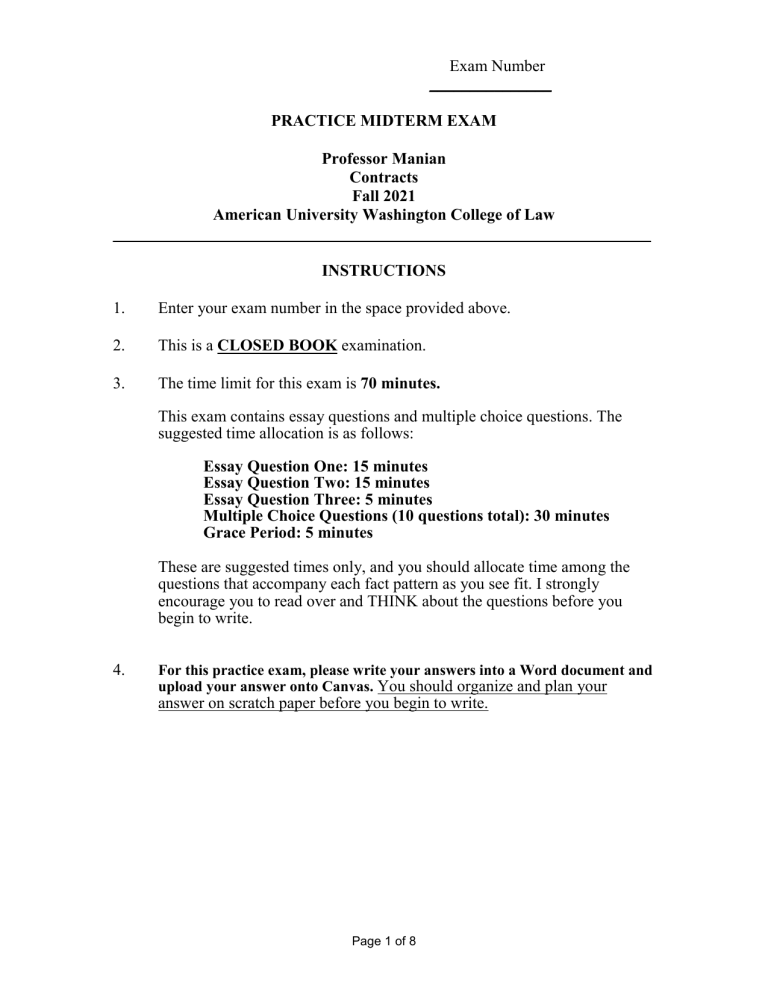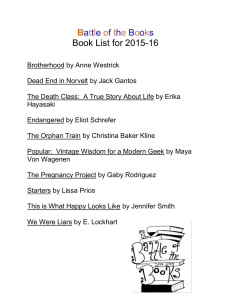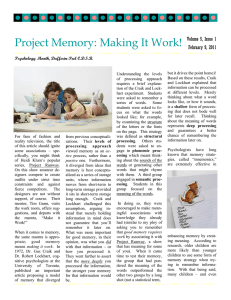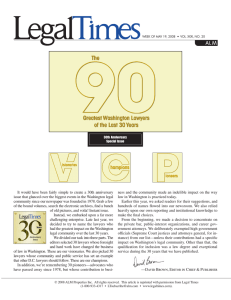
Exam Number _______________ PRACTICE MIDTERM EXAM Professor Manian Contracts Fall 2021 American University Washington College of Law __________________________________________________________________ INSTRUCTIONS 1. Enter your exam number in the space provided above. 2. This is a CLOSED BOOK examination. 3. The time limit for this exam is 70 minutes. This exam contains essay questions and multiple choice questions. The suggested time allocation is as follows: Essay Question One: 15 minutes Essay Question Two: 15 minutes Essay Question Three: 5 minutes Multiple Choice Questions (10 questions total): 30 minutes Grace Period: 5 minutes These are suggested times only, and you should allocate time among the questions that accompany each fact pattern as you see fit. I strongly encourage you to read over and THINK about the questions before you begin to write. 4. For this practice exam, please write your answers into a Word document and upload your answer onto Canvas. You should organize and plan your answer on scratch paper before you begin to write. Page 1 of 8 5. Your essay answers will be graded on your demonstrated understanding of the law and its relationship to the facts presented and upon the clarity of your organization. An organized answer will score better than one that hits issues in a stream-of-consciousness fashion. THINK BEFORE YOU WRITE. Analyze all issues thoroughly but concisely. Essay answers are expected. (However, if you are running out of time on a question, you may use bullet points, abbreviations that are comprehensible, phrases rather than sentences, even outline format, as long as your analysis is understandable and demonstrates your ability to apply the appropriate constitutional standards to the given facts.) 6. If you believe additional facts are necessary in some instances in order to reach a conclusion, state the additional facts and explain why they are material. Page 2 of 8 Essay Question (Three Questions) Professor Gilderoy Lockhart is desperately seeking a research assistant to help him with his latest book, “Magical Me Part II.” Professor Lockhart is on a tight publishing deadline so he decides to post flyers around his school, Hogwarts, seeking a student research assistant. The flyer declares: “Professor Gilderoy Lockhart is seeking an outstanding student to provide research assistance in the completion of what will surely be another best selling book detailing Professor Lockhart’s momentous magical adventures. Any student may submit an application for this position, but Quidditch players are preferred. Please submit your application through the Hogwarts mail system so that Professor Lockhart can receive your applications quickly (owls take too long). Time is of the essence! Payment will be by supply of Weasleys’ Wizard Wheezes Whiz-bangs.” Lockhart posts the flyers around the school on January 1st. Draco Malfoy notices the flyers on January 5th. Malfoy has been seeking a supply of Whiz-bangs, since Whizbangs sold out in December. Malfoy decides to apply for the research assistant position. On January 7th, he drops his application for the position in the Hogwarts mail system. Professor Lockhart interviews him on the afternoon of January 8th and says he will hire Malfoy in exchange for 100 Whiz-bangs. Malfoy says, “I’d love to work for you but I need at least 200 Whiz-bangs.” Professor Lockhart responds, “I’ll hire you for 100 Whizbangs at a minimum, but if I in my great wisdom think your work is worth 200 Whizbangs I may decide to give you that amount.” Draco asks for 24 hours to think it over and Professor Lockhart agrees. The next morning of January 9th, Malfoy overhears Neville Longbottom telling his friends that he heard a rumor Professor Lockhart has hired Oliver Wood as his research assistant just that morning. Malfoy runs over to Lockhart’s office and tells him, “I accept your offer to work for 100 Whiz-bangs at a minimum, but 200 Whiz-bangs if you decide.” Lockhart tells Malfoy he is too late and has already hired Wood on the same terms he had offered Malfoy. Malfoy is furious that he lost the chance to earn the Whiz-bangs. Back in early December, Professor Lockhart had placed an order for 200 Whizbangs at $10 each with Weasleys’ Wizard Wheezes (“WWW”), which sold its merchandise online. Lockhart submitted an order form through the WWW website for the Whiz-bangs. WWW emailed a form back to Lockhart stating: “We accept your order of 200 Whiz-bangs at $10 each.” At the bottom of the WWW form was the following language: “Disclaimer: We accept no responsibility for exploding Whiz-bangs. Purchase at your own risk to your life.” Professor Lockhart received the Whiz-bangs by the end of December and paid for them promptly without any further communication with WWW. Continued next page… Page 3 of 8 Shortly after hiring Oliver Wood to be his research assistant, Professor Lockhart accidentally blows himself up with a Weasleys’ Wizard Whiz-bang. After agreeing to Lockhart’s terms, Oliver Wood had already made a deal to sell 100 Whiz-bangs at a very marked-up price to Neville Longbottom and now, after Lockhart’s sudden death, Wood is worried about holding up his end of the bargain. Questions: [Please note – do not worry about breach or damages issues at this point. Focus on discussing the issues we have covered so far.] (1) What contractual rights if any does Draco Malfoy have against Professor Lockhart (or Lockhart’s estate since he is now dead)? Explain raising arguments on both sides as appropriate. (2) If Lockhart’s estate wants to sue Weasleys’ Wizard Wheezes for wrongful death based on faulty merchandise, what contractual rights if any can WWW assert to defend itself? Explain raising arguments on both sides as appropriate. (3) What contractual rights if any does Oliver Wood have against Professor Lockhart’s estate? Explain raising arguments on both sides as appropriate. MULTIPLE CHOICE QUESTIONS BEGIN ON THE NEXT PAGE Page 4 of 8 Multiple Choice Questions 10 Questions 1. On December 15, Lil Nas X and the entertainment manager of a hotel entered into a written contract whereby Lil Nas X agreed to perform at the hotel on May 1 for a fee of $15,000. In early March, Lil Nas X had a hit song that, virtually overnight, made him a star who could command at least $200,000 for a performance. On April 15, Lil Nas X told the manager he would not perform unless he received $200,000 for the performance. The manager told him that “a deal is a deal,” and refused to pay more than the previously agreed upon $15,000. Assuming that Lil Nas X turned 18 on April 16, would he be entitled to refuse to perform the contract? a. Yes, the contract was voidable at his option because he entered into it while he was a minor. b. No, because he implicitly reaffirmed the contract when he asked the manager for more money to perform the same services. c. Yes, because any contract he entered into while he was a minor was void. d. No, because he was earning so much money that he would be considered an emancipated minor, capable of entering enforceable contracts. 2. A 20-year-old woman became ill in a city far from her home. In the expectation of payment, a good Samaritan provided her with food, clothing, lodging, and medical care that were worth $2,500, but through no fault of the Samaritan, the woman died. When the woman’s mother heard about the kindness of the Samaritan, she called him and promised to pay him $4,000. Later, the mother changed her mind and refused to pay the Samaritan anything. Does the mother have a contractual obligation to pay the Samaritan? a. b. c. d. No, because the mother’s performance was not bargained for. Yes, the mother has an obligation to pay $4,000, the amount of the promise. No, because the mother’s promise was not in writing. Yes, the mother has an obligation to pay $2,500, the value of the benefit conferred on her daughter. 3. Which of the following contracts, if communicated orally, would likely not be within a state’s statute of frauds? a. A clothing retailer agrees to sell a men’s suit to a customer for $505. b. A private school and a teacher enter into an agreement on July 1 for nine months of service to begin on September 1. c. A homeowner agrees to sell her house to a buyer, deal to be closed in 90 days. d. A landlord and a tenant agree to the lease of land for 10 years. Page 5 of 8 4. Bri Buyer made an offer to enter into a contract with Selma Seller. Selma wrote to Bri, “I refuse to deal with you because about seven years ago I sold you some goods and you did not pay the $2,000 contract price. My lawyer tells me that it is too late for me to make a legal claim against you because of something called the statute of limitations, but I still don’t like it.” Bri responded by calling Selma and saying, “I understand your situation. I did not pay for the goods because I thought they were defective. I thought we would negotiate a settlement, but we never did. I am now willing to pay you $2,000 for them.” Bri failed to pay Selma anything. Does Bri Buyer have an obligation to pay Selma Seller? a. b. c. d. Yes, but only if Selma Seller accepts Bri Buyer’s new contract. No, because the parties can’t contract around the statute of limitations. Yes, Bri Buyer has an obligation to pay $2,000. No, because Bri Buyer’s promise was not supported by new consideration. 5. The mayor of Philadelphia offered $2,000 to the first person who ran from Washington, D.C. to the Philadelphia Museum of Art in 4 days or less. Ash began running without notifying the Mayor, and as she approached the Rocky Statue in front of the museum, the mayor jumped out from behind the statue and said, “Ha! I revoke my offer!” Ash then completed her run to the museum, which took in total less than 4 days. Is the mayor bound to pay Ash? a. Yes, because Ash prevented the mayor from revoking the offer when she began running; therefore, the attempted revocation was ineffective, and Ash accepted when she completed the performance. b. No, because Ash did not notify the mayor that she had begun performance. c. No, because an offeror may revoke at any time before acceptance, and Ash had not accepted at the time the mayor revoked. d. Yes, because Ash accepted the offer when she began running, so the revocation came too late. Page 6 of 8 6. A greeting card business sent a letter on its letterhead to one of its best customers and said, “We’re offering to sell you up to 5 boxes of greeting cards at $10 per box. This is a firm offer and it is open for the next 20 days.” A week later, the customer walked into the business and the manager said, “If this about that offer on the greeting cards, I’m sorry to say we are going to have to take it back.” The customer then said that she wanted to buy 2 boxes of cards. Was a contract formed between the parties? a. No, because the business’s letter to the customer was an invitation to make an offer and not an offer. b. No, because the offeror can revoke an offer at any time before acceptance, and in this case the offeror did so. c. Yes, because the customer had begun performance in reliance on the offer. d. Yes, because the offer could not be revoked during the time stated in the offer. 7. Chip orally agreed to sell his vacant lot to Angelique for $100,000. Angelique gave Chip a down payment of $10,000. With Chip’s consent, Angelique took possession of the land and began to build a house on it. Chip then repudiated the agreement, claiming that it was not enforceable under the statute of frauds. What is the likely result? a. The contract will not be enforced, but Angelique can recover the $10,000 deposit as liquidated damages. b. The contract will be enforced by specific performance because of Angelique’s reasonable reliance. c. The contract will be enforced because performance had begun. d. The contract will not be enforced, but the buyer will recover in restitution for the value of the benefit she conferred on the seller. 8. Donovan was hired as a legal assistant by the law firm Alpha & Beta LLC. After he had been on the job for a month, the managing partner sent him a letter informing him that the corporation would pay him a pension when he retired. Twenty years later, suffering from an illness that made it difficult to work, Donovan decided to retire and live on the firm’s pension. For a few months, the law firm paid the pension. Then a new managing partner took over and looked for ways to save money. Disregarding any relevant statutes, can the law firm stop paying the pension to Donovan? a. b. c. d. Yes, because the promise was a gift promise. No, because the firm is contractually bound to pay Donovan. No, because Donovan relied on the promise. Yes, because justice does not require payment of a full pension. Page 7 of 8 9. Jack and Jill went up a hill to tour a beautiful penthouse belonging to Jill’s aunt. Jack and Jill both enjoyed the home and decided they wanted to get it. The market value for the home is $1 million. The realtor is telling Jack and Jill that she thinks the aunt is willing to sell the penthouse to her niece Jill for a lower price of $975,000. What is the minimum consideration required for Jack and Jill to enter into an enforceable contract for the home? a. Consideration must be at least $1 million, the market value. b. Consideration must be at least $975,000, the offered price. c. Consideration must be some nominal value. d. Consideration must be at least greater than a nominal value. 10. Rebecca and Crissy went on a date to a basketball game. The tickets to the game were $45 each, and Rebecca paid for both tickets. During the game, Rebecca learned that Crissy was working in a salon doing nails. About a week later, Rebecca went to Crissy’s salon and got her nails done. At the end of the service, Crissy told Rebecca that the total was $50. Rebecca told Crissy that she paid for the basketball game tickets so that she didn’t need to pay her. Rebecca left without paying. Crissy now wants to sue Rebecca for that money. What will be the likely outcome of that suit? a. Rebecca will likely not have to pay for the service because she paid for the basketball tickets, so now they are even. b. Rebecca will likely pay only $5 because the service was $5 more than the ticket. c. Rebecca will likely not pay because the basketball game ticket was past consideration that was already performed. d. Rebecca will likely pay $50 because there was no bargained-for exchange; the basketball game ticket was likely just a gift. END OF EXAM Page 8 of 8





